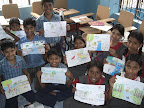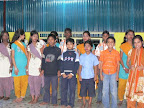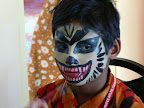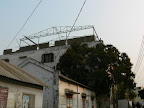We arrived in Gawair in the middle of the night two weeks ago. We couldn't see the huge pot holes filled with sewerage that stretched across the roads but we could feel them. The air was moist and humid and smelt of smoke. It was two am, but the towering garment factories on either side of the road with their fluorescent lights beaming lit up the night sky. The several garment factories in Gawair make up just a few of the 4,000 or so factories in Bangladesh; purpose-built brick monuments to the instant money to be made from a global clothing industry.
The garment factories in Bangladesh have deep historical roots to the 18th century when the British banned the importation of Indian silk that was far superior to anything that could be produced in Britain. Ironically, it is now the objective of Western powers to ensure that countries like Bangladesh do not adopt the protectionism which proved essential to the effective development of their own industry three hundred years ago. Despite the violence and war that plagued Bangladesh in the 1970's and 1980's, it is in fact economic rather than military forces that are proving more effective in constraining the Bangladesh people, particularly women. Bangladesh is now an export-processing zone; garments earn two-thirds of the foreign exchange. About 800,000 people work in the garment factories of Dhaka, three-quarters of them are women.
During my time volunteering at The Dhaka Project I have been assisting in turning the current sewing centre into a profitable enterprise by writing and implementing a business plan and designing a new range of products. The sewing centre at The Dhaka Project is designed to combat the growing problem that is preventing the women of Bangladesh escaping from the cycle of poverty. Providing training and then opportunities to get involved in production, The Dhaka Project Sewing Centre will give the women in The Dhaka Project Community a sustainable business which will be a tremendous benefit for the community. The Dhaka Project Sewing Centre is undergoing expansion and has just moved to a new location guaranteeing space and excellent working conditions. During their nine to five shift the women receive two meals and regular breaks.
In the short term we intend on employing over twenty new production staff who are parents in our community, as well as providing paid training to parents and sisters of children in our school who have never sewn before. Once equipped with knowledge and skills in karchupi and sewing the women in training will have the opportunity to quickly move into production if they wish, and earn a substantial salary of over 1500 taka per month.
The Dhaka Project Sewing Centre will begin targeting Emirates Airlines Air Crew, a market with which we have a great relationship and whom we know will be receptive to our ideas. Creating a fusion of Western clothes with Bangladeshi characteristics, the bags, scarves and clothing will bear The Dhaka Project logo. We look forward to this being a very successful venture, whereby we can quickly grow and promote our free trade practice and break the cycle of poverty that is unfortunately being repeated all over this beautiful country.
skip to main |
skip to sidebar
The sponsorship of a child at The Dhaka Project for one year, covering the basic costs with:
-School Education
-Food Supply
-Healthcare including vaccin.
-Uniforms including shoes.
--- is now fixed in 600 AED
( ~120 EUR or ~165 USD).
Funds Donations
Items Donations
(drop off points):
In Dhaka: - Westin Hotel
Mariams' Video at The Dhaka Project
Photography Workshop by Samar Jodha
The Dhaka Project Video
Welcome!
The Dhaka Project is an organisation which provides free education, health care and community support for nearly 500 children from the slums of Dhaka. The project is run entirely on donations. Please visit our website for more information.
OUR MAIN SUPPORTER
Emirates Airline Foundation
The Emirates Airline Foundation has been the plattform to reach our goals of maximizing the potential of the forgotten and neglected children in Dhaka. Without them and my fellow working colleagues such as pilots, cabin crew, administration team, management team and everyone belonging to the family of Emirates Airline and Emirates Foundation, The Dhaka Project wouldn't have taken off to such great hights! From the bottom of of our hearts, THANK YOU !
The Emirates Airline Foundation has been the plattform to reach our goals of maximizing the potential of the forgotten and neglected children in Dhaka. Without them and my fellow working colleagues such as pilots, cabin crew, administration team, management team and everyone belonging to the family of Emirates Airline and Emirates Foundation, The Dhaka Project wouldn't have taken off to such great hights! From the bottom of of our hearts, THANK YOU !
SPONSORSHIP
-Food Supply
-Healthcare including vaccin.
-Uniforms including shoes.
--- is now fixed in 600 AED
( ~120 EUR or ~165 USD).
How to Donate
(drop off points):
In Dhaka: - Westin Hotel
OUR OFFICIAL SONG by Josh Last
MEDIA ARTICLES
Volunteer Information
More Information?
Contact Us
Some Videos
Mariams' Video at The Dhaka Project
Photography Workshop by Samar Jodha
The Dhaka Project Video
Photo Albums
Samar Jodha Workshop
April 2008 - Events
Awards and Staff Party
Mariam - Anas - Bader
Emirates Foundation School
Latest Supporters
- Baby Shop
- Jebel Ali School
- Shoe Mart Dubai
- Rotana Towers - Dubai
- Crossline
- Tenzing Marketing Consultancy
- Al Diyafah High School
- Children Oasis Nursery School Dubai
- The Bagha Club
- Abraaj CPP
- BCD Travel
- Burjuman
- Crew 24
- Delta Partners
- Dubai Adventure Mums
- Dubai British School
- Dubai Gem School
- Dubai Irish Society
- Emaar
- Gulf Photo Plus
- HELP
- Jebel Ali Primary School
- Jumeirah English Speaking School
- JuteKompaniet
- Little Land Nursery School
- More Cafe
- Rahimafrooz
- Rashid School for Boys
- Sharanis Wellness Spa
- Singaporean Ladies
- Time Out Dubai
Those Who Talk About Us
- 7 Days
- Air Crew Magazine
- Alma de Viajante
- Amader Pathshala
- Care2
- Couch Surfing
- Dhaka Dialogue
- Drive Arabia
- Dubai Kidz
- EPIC TASMAN 2010
- Farmacia Carlos Lucas
- Gap Crafts
- Giving...
- Hillingdon Manor School
- IHC
- Imedge Dubai
- Independent Volunteer
- Joy Bangla
- Pipoca Morango
- Quironn
- RADIO 1
- Street Children
- TEAM EPIC
- The 3rd World View
- The Idealist
- True Travellers
- What 2 Do 4 Crew
Blog Archive
-
▼
2008
(344)
-
▼
July
(45)
- PEDRO AND CRISTIANA'S JOURNAL 4
- GEORGIE'S JOURNAL III
- PEDRO AND CRISTIANA'S JOURNAL 3
- Kids' Hygiene Class
- Distribution Of Donated Clothes
- Thanks to The Dhaka Project and it’s Brazilian sup...
- Thank you Crossline
- VOLUNTEERS ACTIVITY IN DUBAI
- PEDRO AND CRISTIANA'S JOURNAL 2
- WE MOURN ANOTHER LOSS - RABEYA BEGUM REST IN PEACE
- RICHARD'S JOURNAL - THE HIGHS AND LOWS
- PEDRO AND CRISTIANA'S JOURNAL 1
- RELATIONSHIP WITH JOYBANGLA.INFO
- LYNDA'S BACK!
- FIONA'S FEEDBACK
- MORE SALES TO RAISE FUNDS
- NEW LIBRARY + COMPUTER LAB.
- Food Prices to Child Marriage
- MEETING WITH PARENTS II
- GEORGIES JOURNAL II
- HOW COULD MARCELO DO ALL THIS ?
- JENNA'S JOURNAL II
- BIRTHDAY FOOTBALL MATCH!
- THANK YOU !
- Food For Thought
- Little Master
- OUR SPECIAL SECURITY GUARDS !
- KATJA FEEDBACK II
- Fiona's Journal - June 2008
- SOLANGE - ALWAYS ON THE MOVE !
- Winners
- KATE'S FEEDBACK 2
- CHILD IN DANGER !
- RICHARD'S JOURNAL - 3 YEARS AND COUNTING
- DONATIONS AND HELP
- JENNA'S JOURNAL - WEEK 1
- GEORGIE'S JOURNAL - WEEK 1
- THANKS TO ALI KHALED AND 7DAYS
- THE DHAKA PROJECT : BRAZILIANS TO THE RESCUE !
- THANKS TO BEXTA !
- ON BEHALF OF A DREAM !
- CLOTH SHOP JUST OPENED !
- HARD WORKING DAY IN DUBAI
- THE DHAKA PROJECT COMMUNITY CLINIC !
- RICHARD'S FRIENDS - DRUG COMPANIES (TAKE 2)
-
▼
July
(45)






No comments:
Post a Comment